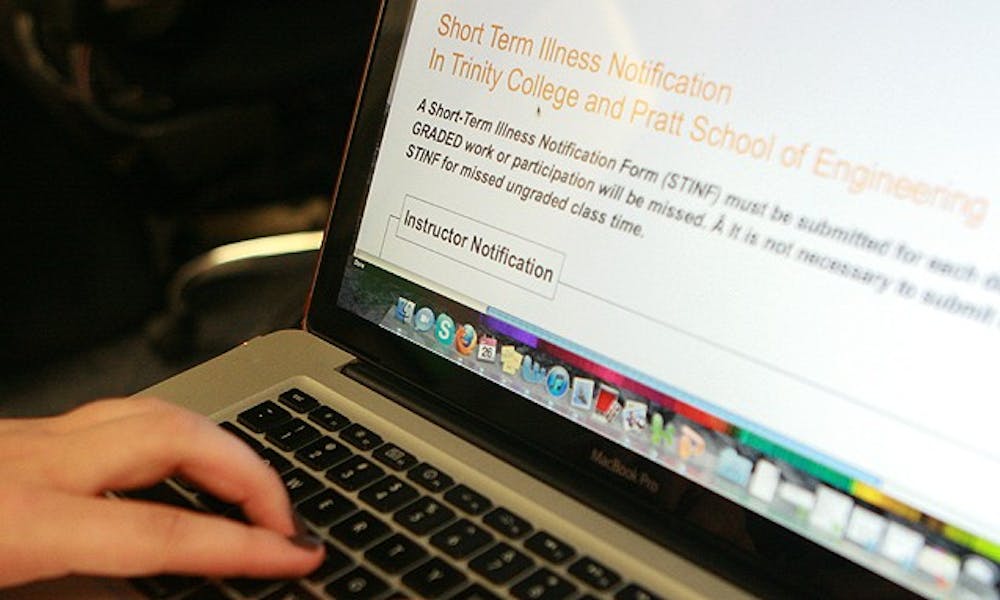Students should think twice if they want to use a short-term illness notification form to skip class.
The Office of Student Conduct Advisory Group—comprised of student leaders and Office of Student Conduct administrators—met Friday to discuss recent changes to student conduct policy. The discussion focused on changes to short-term illness form, student leader accountability and the alcohol amnesty policies, said junior Gurdane Bhutani, Duke Student Government executive vice president and advisory group member.
STINF policy now requires students to contact their professors within 48 hours of submitting the form—otherwise, professors are under no obligation to accept work from students who miss class. The form now includes a statement clarifying that STINF only applies for students with an incapacitating illness—meaning a student cannot send in a STINF for a headache or a cold, said Lee Baker, dean of academic affairs of Trinity College of Arts & Sciences.
“It’s been in the administrators’ eyes for a while that the policy needed to be changed,” Honor Council Chair Nick Valilis, a senior, said. “It was too easy to submit the form. [We] want to make people think a little bit harder.”
Administrators have not yet informed students about the additions—STINF instructions on the Trinity website now reflect the changes, but those on the Pratt School of Engineering website do not. Trinity faculty plan to discuss how to best inform students Wednesday, Baker said.
DSG and the Honor Council plan to increase student awareness, Bhutani and Valilis said.
Academic deans began to track STINF usage last Spring, Valilis said. The monitoring revealed that the number of submitted forms has increased over time.
Baker said he does not know if this indicates that students are abusing the system, but said he has noticed some students who use STINFs more than others—and some who have faked illness.
Biology Department Chair Dan Kiehart said his department began to notice that the amount of STINF forms for a gateway biology course kept increasing throughout the Spring. About 10 percent of the students in the class submitted STINF forms for a quiz, and about 20 percent submitted a STINF for another assignment, Kiehart said.
“It was simply getting out of hand,” Kiehart said.
Administrators and students were considering amending STINF policy for the last few months, Baker said, adding that they are now working on the changes together.
Valilis said he was approached by administrators over the summer to provide insight on this issue. He added, however, that when he was invited to discuss it again earlier this semester, some changes had already been implemented without his input. Administrators were receptive to his suggestions though, for example, including the requirement that students to contact their professors.
He noted that he believes the administration should have consulted more students.
“I had ownership in this process,” Valilis said. “But I would hope in the future they will discuss these kinds of changes with others.... This is why we have student advisory groups.”
Stephen Bryan, associate dean and director of the Office of Student Conduct, did not attend Friday’s discussion because he was at a meeting with the Board of Trustees.
Assistant Dean of Students David Frankel and Valerie Glassman, senior program coordinator for the Office of Student Conduct, attended the meeting Friday but deferred comment to Bryan, who generally acts as a liaison between the advisory group and Vice President for Student Affairs Larry Moneta.
Moneta, who has the final say on student conduct policies, could not be reached for comment.
Student leader accountability
The advisory group also decided to allow members of DSG and the Council on Collaborative Action to redraft a controversial student conduct policy, which allows administrators to hold student leaders accountable for their group members’ actions. Bhutani said the vague wording of the policy—on an indefinite moratorium—is causing concern among student leaders about how the policy will be applied.
“The advisory group as a whole agreed there’s a fair justification for the policy,” Bhutani said. “Students need to feel like we’ve created a policy that’s fair to us, and [administrators] have to understand where we’re coming from, and let us do this on our own.”
He added that policies like this give a wide amount of discretion to the student conduct administrators reviewing violations because the rules are so broadly defined.
Bhutani hopes the group will come to a resolution in October.
Alcohol amnesty policy
The health and safety intervention clause of the University alcohol amnesty policy—commonly known as the amnesty policy—is still under review for potential changes. Bhutani said the policy will be on hold for at least a semester until the University is able to review data that indicates whether or not the amnesty policy is effective.
Current policy states that formal disciplinary action for violating the alcohol policy will not be taken against students who seek medical assistance for themselves or others if no other University policies have been violated. A potential change to the policy could make it so that students violating alcohol policy while seeking medical assistance could later face disciplinary action if the student has a subsequent violation.
Duke partnered with several other universities for the Learning Collaborative on High-Risk Drinking, sponsored by Dartmouth College, in May. Bhutani said policy changes should only be considered if data collected by this initiative strongly indicates that amnesty is ineffective.
“It’s pretty clear that [amnesty] is effective—but if there’s science saying it isn’t, we might want to reconsider,” he said.
Bryan wrote in an email Monday that policy changes are on hold in order to increase student awareness of the potential amendments. The concept of the amnesty policy would not change except to clarify what would occur if there was a subsequent violation of the alcohol policy, he added.
“This is simply an effort for a hearing body to have all available information in making a decision on how to respond to that subsequent incident,” Bryan said.
Get The Chronicle straight to your inbox
Signup for our weekly newsletter. Cancel at any time.

